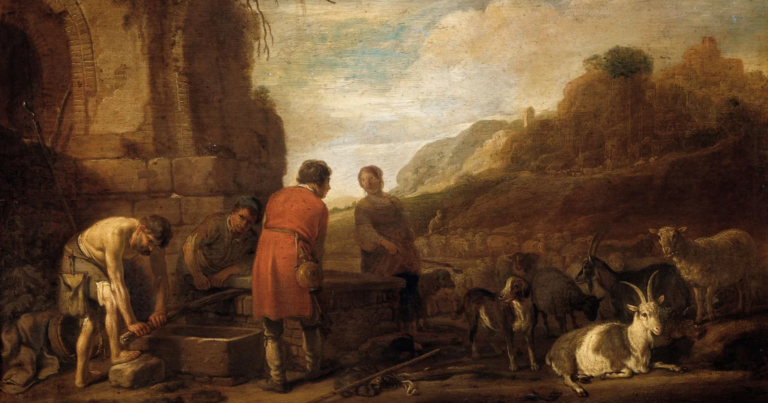“Cast all your anxiety on Him because He cares for you.”
1 Peter 5:7
Facing life’s adversities with resilience and hope can often feel like an insurmountable challenge.
The First Letter of Peter stands as a testament to the power of faith during times of trial, offering hope that has illuminated the path for believers for centuries.
This letter, written to early Christians enduring persecution, resonates deeply with anyone confronting the trials of life today.
It encourages us to hold fast to our faith, promising that suffering not only tests but also refines us.
Let’s explore this ancient text, delve into its core teachings, and see how it can empower us to face life’s challenges with faith and courage.
Overview of First Peter
The First Letter of Peter is the second of seven catholic or universal letters of the New Testament of the Bible, along with James, Second Peter, the First, Second, and Third Letters of John, and Jude.
These letters are so called because they are addressed to the universal Church in general and not to a specific community such as, for example, the Philippians.
Composed by Simon Peter, a fisherman called to be an apostle by Jesus Christ, this letter serves as a pastoral beacon during times of suffering and persecution.
Its content is neatly organized into distinct sections:
- An opening salutation that establishes its Trinitarian foundation;
- Teachings on the Christian conduct amidst suffering;
- Concluding exhortations and blessings.
Peter emphasizes the importance of humility, perseverance, and casting one’s anxieties on God, who cares deeply for His followers.
This epistle serves as a manual for enduring life’s trials with faith, showcasing how suffering can lead to spiritual growth and ultimate salvation.
Through its teachings, believers are encouraged to embrace their journey with courage, grounded in the promise of God’s unfailing support and love.
Who was St. Peter?
Simon Peter was a Galilean fisherman with an extraordinary destiny.
His life took a pivotal turn the day his brother Andrew led him to Jesus, declaring, “We have found the Messiah.”
It was at this moment that Jesus saw something special in Simon, renaming him Peter, meaning ‘rock’. This marked the beginning of Peter’s transformation from an everyday fisherman to a foundational figure in Christianity.
Peter’s life took a significant turn when, upon Jesus’s request, he caught a miraculous number of fish. In simple terms, this demonstrated the power of faith and obedience.
Following this event, Jesus called Peter and his companions to become “fishers of men” — a call to which Peter responded by leaving everything behind to follow Christ.
This commitment led Peter through a path of profound spiritual growth and leadership.
Keep in mind that Peter was not only a spiritual figure — he was also a married man, deeply rooted in the realities of everyday life.
His personal experiences, including his marriage and his work as a fisherman, enriched his ministry and made his teachings more relatable.
Core themes in St. Peter’s first letter
1) Role of suffering
“Whoever is made to suffer as a Christian should not be ashamed but glorify God because of the name.”
I Peter 4:16
Suffering, a theme that surfaces repeatedly in St. Peter’s first letter, is not presented as a mere consequence of faith but as a pivotal part of the Christian journey.
Peter frames suffering as a test of faith, a purifying fire that, while challenging, leads to spiritual growth and strength.
He encourages believers to embrace suffering for doing good as a reflection of Christ’s own sufferings.
For instance, Peter highlights the story of Christ’s suffering, emphasizing that it was through His trials and tribulations that we find our path to righteousness.
Consider this passage:
“For it is better, if it is God’s will, to suffer for doing good than for doing evil.”
It’s clear that this perspective shifts the narrative from suffering being a burden to being a badge of honor. And this, in turn, signifies a deeper communion with Christ’s own experiences.
What’s more, St. Peter draws a direct line between the sufferings of Christ and those experienced by Christians.
As he suggests, these trials are part of what refines and purifies faith.
2) Living righteously
“Live as free people, but do not use your freedom as a cover-up for evil; live as God’s slaves.”
1 Peter 2:16
This quote underscores a pivotal theme of the Letter: living a life of righteousness.
It challenges believers to use their freedom wisely, not as an excuse to sin, but as an opportunity to serve God wholeheartedly.
Peter employs the metaphor of sheep and shepherd to illustrate the transformative journey of believers.
This passage serves as a poignant reminder of our predisposition to wander away from the path of righteousness, only to be lovingly guided back by Christ, our Shepherd.
St. Peter urges us to lead lives that are not just outwardly pious but deeply rooted in genuine faith and love.
However, this isn’t about putting on a show for those around us but living in a way that is true to our convictions, even when it’s hard.
It means making choices that reflect our beliefs, standing firm against pressures, and resisting the urge to conform to societal norms that conflict with our values.
Peter’s message is raw and honest:
The path of righteousness is not the easiest, but it is the most rewarding.
It’s a journey of integrity, where each decision and action aligns with our deepest spiritual commitments, showcasing a living faith that speaks louder than words.
3) Hope amidst persecution
At first glance, finding hope in times of persecution might seem counterintuitive.
Yet, this is exactly what Peter offers his readers.
The thing is that this letter doesn’t shy away from acknowledging the harsh realities faced by early Christians, such as:
- Social ostracism
- Persecution,
- Even death.
However, instead of advising them to retreat or despair, it empowers them with a vision of hope that transcends their current suffering.
This hope is anchored in the promise of salvation and eternal life. That’s what makes the temporal trials bearable in light of the eternal reward that awaits them.
4) Faith under fire
Now, let me ask you a question:
When your beliefs are tested, how do you respond?
St. Peter addresses this question head-on by discussing the concept of “Faith Under Fire.”
In his letter, he acknowledges the harsh reality that believers may face scorn and hostility because of their faith. Yet, it is precisely in these moments of trial that one’s faith can shine the brightest.
Peter encourages believers to stand firm, maintaining their integrity and convictions, even when the world seems against them.
Therefore, I believe that it’s a call on readers to reflect on their own experiences of adversity, challenging them to see these trials as moments to not only demonstrate but also deepen their faith.
5) The impact of community
Think back to a time when the support of friends or family made a difference in your life.
St. Peter’s letter shines a light on the undeniable impact of community in our spiritual journey. He teaches us that together, as a community, we are stronger, able to uplift one another in times of need and celebrate together in times of joy.
Our faith, while personal, is also communal, meant to be shared and strengthened by the bonds we form with others.
What does it mean for you, as a Christian?
Well, this message is a reminder that you are not alone — we are all part of a larger family. It’s a community of believers who walk this path together, offering support, understanding, and encouragement every step of the way.
Remember that Peter’s focus on community is not just for mutual support but is also seen as a testament to God’s grace in action within the world.
By living out these principles, believers can strengthen their collective faith and witness the transformative power of God’s love in their lives.
6) Why love matters
Have you ever considered the profound power of love in your life?
St. Peter’s letter places love at the heart of the Christian faith, reminding us of its transformative power.
And let’s be honest:
Love is not just a feeling. It’s an action, a commitment to living out our faith through our deeds and relationships.
It’s about showing up for others, offering forgiveness, and extending grace, just as we have received it.
That being said, St. Paul’s message about love is both empathetic and empowering. At least, it urges you to let love guide your interactions and to see the ripple effect it creates in the world around you.
By embracing love, we embody the very essence of our faith, building bridges and healing wounds. After all, in every act of love, no matter how small, you are making a difference.
7) Call to holiness
“As obedient children, do not conform to the evil desires you had when you lived in ignorance. But just as He who called you is holy, so be holy in all you do; for it is written: ‘Be holy, because I am holy.'”
1 Peter 1:14-16
This passage from The First Letter of St. Peter emphasizes the transformative call to holiness that is central to the Christian life.
It challenges believers to rise above their former ways and embrace a life of purity and devotion, mirroring the holiness of God Himself.
The call to holiness is a profound reminder of the purposeful design of our faith journey—not merely to avoid wrongdoing but to actively pursue a life that reflects God’s character.
In this context, holiness is not an unreachable ideal but a daily commitment to:
- Living with integrity and purpose
- Aligning our actions with God’s will
- Cultivating a heart that seeks after God
This scripture invites readers to introspect on their spiritual growth and how they are embodying the holiness that God calls them to.
In essence, it beckons believers to not just believe in God but to strive towards reflecting His purity and goodness in every aspect of their lives.
Embracing submission
“Submit yourselves for the Lord’s sake to every human authority: whether to the emperor, as the supreme authority, or to governors, who are sent by him to punish those who do wrong and to commend those who do right.”
1 Peter 2:13-14
This segment from The First Letter of St. Peter introduces a complex and often misunderstood theme:
Submission to authority.
Therefore, it encourages believers to respect and submit to their leaders, not as a sign of weakness or blind obedience, but as an act of faith in God’s sovereignty over all aspects of life.
Interestingly, this call to submission is not just about adhering to laws or societal norms. It also shows the importance of embracing humility, respect, and trust in God’s plan for order and governance.
Understanding and practicing this form of submission involves:
- Recognizing God’s ultimate authority above all
- Viewing submission as an act of faith and obedience to God
- Balancing the call to submission with the Christian duty to stand for justice and truth
This teaching challenges readers to reflect on their attitudes towards authority and their understanding of submission in light of their faith.
It serves as a reminder that submission, when rooted in faith and respect, can be a powerful expression of trust in God’s greater plan.
Your next steps in faith
All in all, the First Letter of St. Peter offers profound insights into the Christian life, addressing themes of suffering, holiness, submission, and the enduring nature of faith.
For readers seeking to deepen their understanding and application of this epistle’s teachings, the next stage involves practical reflection and action.
That’s why I’d like to encourage you to consider these actions to further engage with the letter’s wisdom:
- Reflect personally on each theme discussed. How do these concepts manifest in your life?
- Identify one area of your life where the teachings of this letter can bring transformation. It may involve adjusting your response to personal challenges, enhancing your role within your family or community, or deepening your spiritual practices.
- Implement the teachings in daily life. Whether it’s practicing submission in a godly manner, striving for holiness, or finding joy amidst trials, look for tangible ways to apply Peter’s guidance.
Because your next stage should be about moving from knowledge to action, letting the apostle’s insights mold you into a more faithful follower of Christ.








